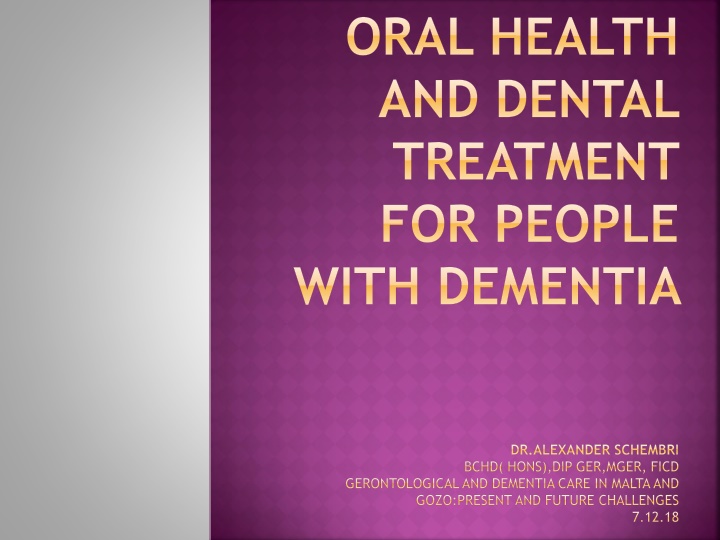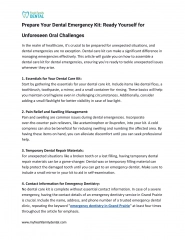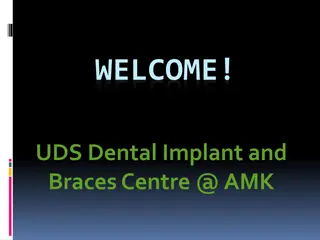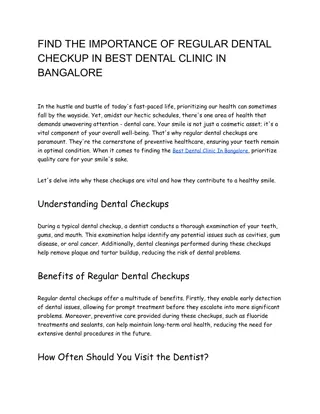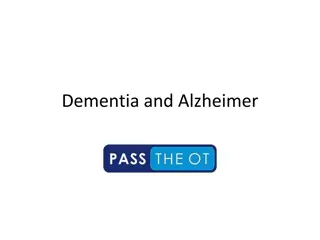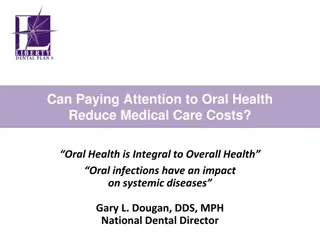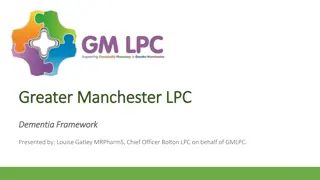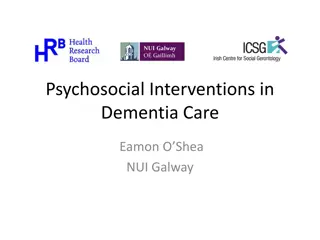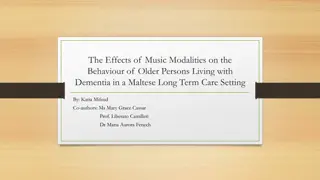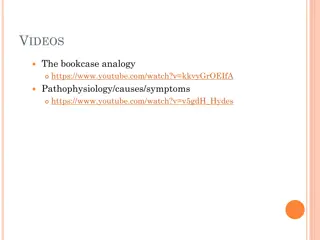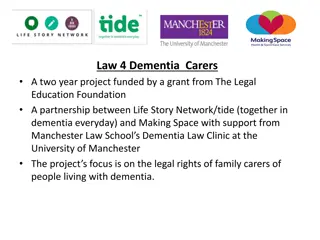ORAL HEALTH AND DENTAL TREATMENT FOR PEOPLE WITH DEMENTIA
Providing oral health and dental treatment for individuals with dementia presents unique challenges for dentists. These challenges include the individual's inability to voice their needs, maintain daily oral hygiene, make informed choices, and give valid consent for treatment. Barriers to oral health in dementia patients stem from the severity and stage of dementia, cognitive impairment, lack of perception of oral health care issues, previous dental history, medication effects, and more. People with dementia often experience poorer oral hygiene, leading to conditions like gingivitis, periodontal disease, and dental caries. Various assessment systems, ranging from simple screenings to complex clinical examinations, can help in evaluating oral health risks in individuals with dementia.
Download Presentation

Please find below an Image/Link to download the presentation.
The content on the website is provided AS IS for your information and personal use only. It may not be sold, licensed, or shared on other websites without obtaining consent from the author.If you encounter any issues during the download, it is possible that the publisher has removed the file from their server.
You are allowed to download the files provided on this website for personal or commercial use, subject to the condition that they are used lawfully. All files are the property of their respective owners.
The content on the website is provided AS IS for your information and personal use only. It may not be sold, licensed, or shared on other websites without obtaining consent from the author.
E N D
Presentation Transcript
ORAL HEALTH AND DENTAL TREATMENT FOR PEOPLE WITH DEMENTIA DR.ALEXANDER SCHEMBRI BCHD( HONS),DIP GER,MGER, FICD GERONTOLOGICAL AND DEMENTIA CARE IN MALTA AND GOZO:PRESENT AND FUTURE CHALLENGES 7.12.18
QUALITY OF LIFE AND ORAL HEALTH Functions: Mastication and speech Pain/discomfort: Acute or chronic Social: Appearance and self esteem
The dentist faces the challenges when providing treatment for people with dementia who may no longer have, or will reach a stage when they no longer have, the ability to: Voice their needs for oral health care and treatment Carry out daily oral hygiene to a level that prevents dental disease Make informed choice Give valid consent for treatment
BARRIERS TO ORAL HEALTH : The severity and stage of the dementia The individual level of cognitive impairment and physical disability Lack of personal perception of oral health care problems Previous dental history, including oral health care and dental assistance Ability to receive oral hygiene care from carers and/or the dental team Impact of medications leading to xerostomia Capacity to consent to care Lack of information on how to access the dental services Attitudes of the dental team and carers regarding ageing and dementia
ORAL HEALTH People with dementia have poorer oral hygiene The loss of cognitive and motor skills as dementia progresses reduces the ability to carry out oral hygiene procedures. Reliance on carers who may not have the motivation, knowledge, skills or training necessary to carry out oral care Gingivitis, periodontal disease more common with higher plaque scores,more calculus and heavier gingival bleeding Higher coronal ,cervical and root caries
ORAL HEALTH RISK ASSESSMENT Three broad groups of assessment systems: An Intra-oral assessment can be simple, as in screening; or complex, as in full clinical examination Observed or reported behaviour may be more effective than those based on clinical examination, for individuals who are less able to be compliant Assessment of the individual perception of need and subjective value of oral health is valuable during the early stage of dementia
INDEX OF DENTAL MANAGEMENT TO ASSESS ABILITY TO CO-OPERATE FOR DENTAL TREATMENT Can patient brush teeth or clean dentures? Yes(0) Can patient verbalise chief compliant? Yes(0) Needs some assistance (1) Needs complete assistance (2) To limited degree (1) No (2) Can patient follow simple instructions? Yes (0) e.g. sit in chair Can patient hold radiograph in mouth with film holder? Yes(0) Occasionally complies (1) Cannot follow instructions (2) Sometimes (1) Never (2) Is patient assaultive (bites/hits)? No(0) Total score 0 Sometimes (1) Always (2) 5 10 Scoring system: 0-3, mild disease (no change in treatment); 4-7, moderate disease (modify treatment plan); 8-10, severe disease (emergency treatment only)
EXPRESSION OF ORAL SYMPTOMS (MOBID SCALE) Changes in behaviour, which can be indicative of oral pain include: Refusal to eat (particularly hard or cold foods) Constant pulling at the face Increased drooling Leaving previously worn dentures out of the mouth Moaning or shouting Disturbed sleep Refusal to co-operate with normal daily activities like tooth brushing Aggressive behaviour towards carers
The dilemma in decision making: When a dental condition requires intervention How to know if cognition is impaired to the point that pain perception is so altered that the patient neither perceives pain nor is able to describe it How to predict which seemingly asymptomatic oral conditions will become symptomatic in the absence of treatment
GENERAL PRINCIPLES FOR ORAL HEALTH CARE Preventive measures to minimize dental disease as soon as possible Dental intervention in the early stages of the condition to manage outstanding dental treatment needs Ensure dentures are named; cleaned professionally on a regular basis; and renewed using a duplication technique when their replacement is necessary Regular reviewed tailored oral health plan to the individuals needs to maintain the oral health status, avoid pain and minimise further interventions
GUIDELINES WHEN PROVIDING ORAL CARE FOR PEOPLE WITH DEMENTIA : Recognition that some people have good days and bad days. Dental care is postponed to a good day and to the individual s best time of the day Short attention spans mean the ability to co- operate is decreased and dental appointments should be kept within the individual's capacity to cope Short-term memory loss means communication can become difficult and tedious. Clear short instructions repeated in the same words are useful The person with dementia is likely to ask the same questions repeatedly
THE ROLE OF CARERS The carer has a role in maintaining daily oral hygiene and in initiating dental treatment, whether it is a routine or emergency care A balance is struck between maintaining independence and maintaining adequate oral health As manual dexterity decreases, electric toothbrushes or toothbrush handle adaptations may help to maintain independence The carer needs instructions and support from the dental team Family members must be trained in regular oral and denture hygiene procedures
DENTAL TREATMENT Early Stage (first 0-4 years) most high quality and low maintenance restorative treatment and preventive care measures are carried out, anticipating the person s decline in co-operation and ability for self-care. Moderate Stage, (2-8 years) the focus of oral care is maintenance and prevention,frequent recall visits and support of carers employed. Late Stage ,treatment focuses on enforcing prevention, maintaining oral comfort and emergency treatment, non-invasive as possible
ADDRESSING THE BARRIERS The provision of domiciliary dental services. Development of team working Access to oral hygiene equipment and maintenance of dignity in care settings Access to information about oral health care and dental service provision Appropriate education and training for care workers and healthcare professionals
